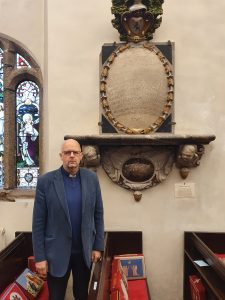Church seeks community’s views on contested memorial
King Charles the Martyr (KCM) Church in Falmouth is in the process of consultation over a contested memorial within the church.
In 2020, the Church of England began to roll out a consultation to churches with the aim of getting them to review their memorials as part of a process on Contested Heritage.
 Like many churches, King Charles in Church Street, has a number of memorials. Joseph Emidy, the prominent black musician, and freed slave who married a local woman and settled in Falmouth, is perhaps the best known.
Like many churches, King Charles in Church Street, has a number of memorials. Joseph Emidy, the prominent black musician, and freed slave who married a local woman and settled in Falmouth, is perhaps the best known.
King Charles Church began its consultation process late last year to decide on the best course of action regarding the future of another memorial, that of Thomas Corker, a 17th Century slave trader and owner and member of a prominent Falmouth family at the time. Since then, there have been conversations with local councillors, we have heard the heartfelt sentiments of the black community and others including local historians as well as a direct descendant of Thomas Corker, himself of mixed heritage, representing the Caulker family.
As a result of that first meeting a decision was made to add a temporary notice while the work continued, which states: “There is contested heritage around this memorial. The church is working with members of the black community and interested parties to move forward and to investigate whether this can be used as an educational tool to address the past wrongs.”
Different views about how best to deal with the memorial
The meetings held so far have been fruitful, although there have been different views about how best to deal with the memorial and progress has been slow over the last 12 months. There is however a clear commitment by everyone involved, including the church community, to find a way to use this as an opportunity for education and awareness about issues of race, slavery and discrimination both in the past and today.
Revd Canon Bill Stuart-White, vicar at King Charles Church, said: “The Corker Memorial is in a prominent position in the church and the message it currently conveys about the despicable transatlantic slave-trade clashes starkly and profoundly with the message of the Christian Gospel.
“None of the present generation of worshippers would wish to be associated with the sentiments of the memorial or to glorify in any way the acts of the man it recalls.
“This is an issue the Church takes very seriously and we are committed to finding the best and wisest way to make good the complex failings of the past.”
Opportunity for an educational resource about Falmouth’s part in the slave trade
The current thinking is that the proximity of the Corker memorial to the Emidy memorial, with contrasting stories relating to the transatlantic slave trade, would present an excellent opportunity for an educational resource about Falmouth’s part in the slave trade and our 21st Century response to it.
Bishop Hugh Nelson said: “We condemn the slave trade, which was abhorrent. We are deeply troubled by the existence of a memorial to Corker, who was a slaver, in a church which points us to the God of freedom and justice.
“We welcome the opportunity to hear everyone’s perspectives”
“Because the church is a public building, we want to continue this conversation with the wider community, and we welcome the opportunity to hear everyone’s perspectives and views.
“It may be that removing the memorial is the best option, but there might also be better and more creative ways to remember those who suffered from the horrors of slavery in the past and to encourage more people to commit to a just and good world today. We want to explore those options as well – and then to come to a clear decision.”
There is a formal process around Contested Heritage and it is likely to take some time to be resolved.
If you would like to share your views, you can do so by emailing Revd Bill here.
